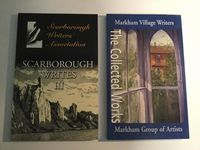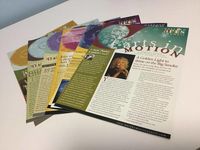Teaching Teens to Write
By Koom Kankesan
Nora Ohanjanians is a retired high school English teacher who taught the Grade 12 Writer's Craft course at the school where I teach. One of my favourite people, Nora is a very warm, giving person. She is honest and brings out the best in people. She assiduously kept track of staff birthdays in our department, and never forgot to procure a cake, making small celebrations out of our lunches.
Nora was equally giving of her time and patience when it came to teaching and interacting with her students. The students in her poetry club who met once a week in her room at lunchtime, to share poems and give feedback, felt exactly the same way I did: here was someone special who found it easy to be authentic and kind. Nora retired a couple of years ago, much to our school's loss. My main justification for this interview is that the world should be filled with more people like Nora.
Koom: You told me recently that you really liked teaching the grade twelve creative writing class. What did you like most about it? What did you least like about it?
Nora: What I enjoyed most, teaching Writer's Craft, was seeing students enjoy writing. I had a student, Elena, who would arrive in class sleepless and fed up with life. A couple of minutes into "free writing practice", which I used to start the class with, her shoulders would relax, and then a smile would slowly spread on her face. It was pure pleasure to watch her eyes sparkle and her hand scribbling furiously. When I would announce that the 10 minutes were up, she would plead "One more minute, Miss!"
There were students who would fall in love with poetry and some who started a poetry club, which ran for a few years at the school. That was a pleasure to see. Poets coming out of the woodwork! Sharing their poems, spending their lunches in the company of other poets. That gave me more than pleasure. I felt proud for them.
Take Samantha who was in my Writer’s Craft class. She tried her best and was intent on getting good marks. When we got to the Poetry unit, it turned out she was a poet! Some students approached me individually and talked about their preferences and passions. Not Samantha. She was serious and opinionated, but quiet and private. When I invited two visiting poets to run a Poetry Slam at the school, I showed the class You-Tube videos of poetry slams and I asked them if anyone wanted to slam with the poets. Samantha, among a few others, volunteered.
On the day of the slam, everyone showed up, but there's no sign of Samantha! I start seething inside, thinking she’s forgotten, until the last minute, when in she comes - no hi, no eye contact - and lines up with the others in front of the 100-person-plus audience. She passionately recites her well-written poem, about a steamy sexual experience, complete with anatomical details and progressive intensity, with the body language to match. The audience explodes in applause. Samantha is embarrassed, as if she’s been caught in an illegal act. She keeps avoiding me that day and the next, until I catch her and tell her how well she did and how proud I am of her. When a couple of teachers approached me about the inappropriate content of Samantha’s poem, I told them she had my full support. It’s hard enough to speak publicly about personal stuff. Even harder when you are a shy 17-year-old, compelled by your urge to write, trying to express yourself.
What I least liked about teaching Writer's Craft was the marking. There was a lot of it, and at times, it took over my life.
Your CanLit News
Subscribe to Open Book’s newsletter to get local book events, literary content, writing tips, and more in your inbox
Koom: You're making me miss my own experiences teaching creative writing in high school! I just learned that our school (after a two year hiatus) will be running the creative writing class on a trial basis again - for the fall of 2017. Of course, I don't know if they will let me teach it or whether enough students will sign up to make it run.
Nora: Wow! That's good news, Koom. Both for the students and for the planet. The more time we, both teenagers and adults, spend on introspection and creative expression, the more evolved we become. And writing is an excellent way of doing that.
Koom: Thanks! So, what is particular to the act of creative writing when you're a high school student, as far as you could tell, as opposed to the adults you would join in your private life? What challenges do high school students face, and what speaks to them in terms of writing creatively?
Nora: During my twenty-five years of teaching, I had many surprises, good and bad. There were students who you thought were honest and hard-working, who then plagiarized and denied it, dashing your trust in human decency. On the other hand there were also students who shocked you with their talent, passion and courage. I was lucky enough to get many of these treats and gifts.
16 year old Amir was not my student, but his English teacher had introduced him to me as a poet, and suggested he attend the weekly meetings of the Poetry Club, that I ran. When he heard about an assembly at which students could perform, he volunteered to recite a poem, and was accepted. I had my misgivings about it, but didn’t want to discourage him, and being a poetry lover, was glad someone finally wanted to present poetry as an art form at a school assembly. Now, assemblies at schools are noisy affairs. Teachers often struggle to keep students quiet and control their behavior. Performers at assemblies are the social and brave types. The performances are often in groups: musical bands, dancers, acrobats etc.
Amir was a slight, timid kid, with acne and glasses. When he got up, alone on that big stage, while the audience was still clapping and hooting for the previous act, and when some noisier kids started throwing comments and heckling him, my heart stopped. I felt scared for this kid, whose urge to write poetry and share it had put him in such peril. He started his eloquent poem, about depression and conflict in his family, first shyly and quietly; but gradually picking up courage, expression, volume, tone, stance and gestures. By degrees, the audience also calmed down, paid attention and tuned in, until there was not a single sound in the auditorium but Amir’s booming voice - one which no one suspected him of possessing. I could barely pick up my jaw from the floor! It was an incredible event on many different levels.
I don't know if I can generalize the challenges and the inspirations of high school creative writing or adult creative writing. I think authors that we like inspire us. We admire their writing and want to be able to write like them. I think that's true about both adults and teenagers. So, writers whom we admire speak to us. In regards to challenges, I think the biggest challenge anyone faces as a writer is the act of writing itself. Being able to sit down for a while and just write. Being able to translate what goes on inside your mind/heart accurately into words. Maybe nowadays teenagers find it more difficult to do the sustained writing with all the distractions in their lives.
Koom: One of my favourite books, The Shallows by Nicholas Carr, focuses on how and why people's biochemistry, their neuropsychologies, are being rewired by our use of electronic devices such as the cellphone and internet. We are finding it harder to read/think/pay attention in a sustained manner. And of course, this makes it harder to write well. Are you seeing these changes/challenges primarily in teens or are you also seeing them in adults as well? Are you seeing them in your own life?
Nora: I think electronic devices, although a huge convenience, are rapidly becoming a social malady. They allow us to communicate conveniently with friends, relatives, and strangers across the globe, but they are also having a negative effect on our attention span. They are affecting all areas of our lives, from driving to personal interactions, from classes to lectures to performing arts to writing. They affect everyone who uses them, young and old. Give my outgoing, talkative 5 year old granddaughter a cell phone or a tablet and she completely disengages from the world around her. Students in classes constantly check their phones. I check my phone all the time, be it at home, in the car, or when I'm in a social setting with friends. Obviously, it interferes with any kind of sustained attention.
Koom: Are you doing anything to combat this distraction in your own life? I'm teaching an ESL Civics class right now where the cellphone thing was a real problem. I was constantly having to take them away. After a particularly bad class, I came in the next day feeling awful and brought up the issue with the students. I couldn't believe it - they readily admitted the problem and one of them suggested that I collect everybody's cellphone at the beginning of class. Most of them agreed and that's what we did. One of the students picked up a basket and everyone voluntarily put their cellphones inside it.
Nora: That's a creative solution to the cellphone problem. Way to go, Koom.
Koom: I know that you told me you're not writing anymore. Is this due to distractions or simply due to lack of desire? I would have thought that once you retired, you might feel the urge in earnest? What is it like to be free of the urge?
Nora: This question required a lot of soul searching. I don’t know if I ever had the urge to write. The intensity of my feeling is more like a desire than an urge. I usually feel the desire to write when I have a strong emotional reaction to someone or something, or something jumps out at me and demands to be recorded and shared. Having said that, most of the writing I’ve done in my life was assigned to me and I had a deadline for it. So, in a way, it had nothing to do with an urge or desire. That is not to say I didn’t enjoy it. I always enjoy writing. Plus, I am by nature a responsible person and I always meet my deadlines, even if it’s at the last minute.
As to why I’m not writing now… first of all, I have to say I’m very unhappy about that, because writing is a satisfying activity for me. Why am I not writing then? Partly it's because I don’t have an assignment and a deadline - as a result, I don’t have a reader - and partly it's because I’ve fallen out of the habit. For years, I used to write for two free print publications, Surface and Symbol and Arts in Motion, published by the Scarborough Arts Council and the Markham Arts Council. I had assignments and deadlines. I got into a rhythm of writing (mostly play reviews) and I enjoyed it very much. I was also a member of first two, then one, writing group(s). So occasionally, I also wrote short stories, personal essays, and poetry. Then the arts councils stopped publishing their papers, and the writing groups folded.
Translating the three dimensional picture/world in my head into words in black monochrome on a flat sheet is a solitary, time-consuming, challenging, and sometimes even painful, process. So, although there are still many ideas, people, and events that invoke a strong emotional reaction in me, if there’s no one waiting to read it, I don’t feel motivated to keep my butt in that chair long enough to spit it out, and then to edit it and make it presentable. So, to summarize my answer to your question, I still have the desire to write, and being retired and at this point in time in my life, I feel I have a lot to write about, but due to lack of external motivation, I have fallen out of the habit to write. Which is ridiculous, right?
Koom: Well, yes and no. In a way, I think it would be nicer to not have to write at all: to only enjoy consuming art, to have more time and be in the peaceful state of mind that would allow.
Nora: Oh, I love consuming art. But creating art is a different category of satisfaction.
Koom: I think that most writers (myself included) like to claim that writing is something they must do, some spontaneous expression, some inexpressible creative urge. The truth is that the recipe also includes a fair bit of ambition and need for self-validation. Maybe even a need for identity-affirmation and love. If a tree falls in the forest and a writer doesn't write about it, how will anyone know that he was there to hear it? I thought that it must be nice to no longer feel impelled by these things?
For myself, I also write to try and be good at it. I like teaching, especially when it's going well, but when writing is going well or I'm doing something similarly creative, it's magic. The rush of endorphins and the feeling of the dopamine cloud are unparalleled. Those things impel me to be the best writer I can be.
Nora: My DNA and neurological chemistry have made me particularly attuned to writing whether I am good at it or not. I can totally understand the need to affirm your identity. I think a big part of the satisfaction of writing, apart from playing with words is getting your voice heard. Your OWN voice, the way YOU see things, the way YOU feel deep inside, either through a character, or a personal essay or opinion piece or poem. Yes, it would be nice not to be impelled by personal interests, but very few humans are capable of that. Maybe Buddha or Maharishi were able to put aside their personalities, but nobody I know is capable of that.
As far as being good at writing, I’ve never felt I’m a good writer. I try to be the best I possibly can, but I don’t think of myself as a good writer. I come from a family of literature and language lovers and teachers. So my love of reading and writing is also genetic. However, because of my extensive reading, I know what good writing is, and mine is rarely that. In regards to getting my adrenaline and endorphin going, writing does a mild job of that. At different stages in my life, I also played the piano, sang, and acted. I enjoyed all of those things and was somewhat decent at them. However, acting was the only art I felt I was good at and got my endorphins going to no end.
The views expressed in the Writer-in-Residence blogs are those held by the authors and do not necessarily reflect the views of Open Book.
Koom Kankesan was born in Sri Lanka. While his family lived abroad, the civil war in Sri Lanka broke out and this caused them to seek a new home. They eventually settled in Canada and have lived here since the late eighties. He has a background in English Literature and Film Studies. Koom contributed arts journalism to various publications before becoming a high school teacher in the Toronto District School Board. Since working as a teacher, he has taken semesters off now and again to work on his fiction. The Tamil Dream, his new book, is his most ambitious to date. It looks at the end of the civil war in Sri Lanka and how it affected Tamils here in Canada. Besides literature and film, Koom has deep interests in history and science, and an enduring love for comic books.
You can write to Koom throughout January at writer@open-book.ca.







